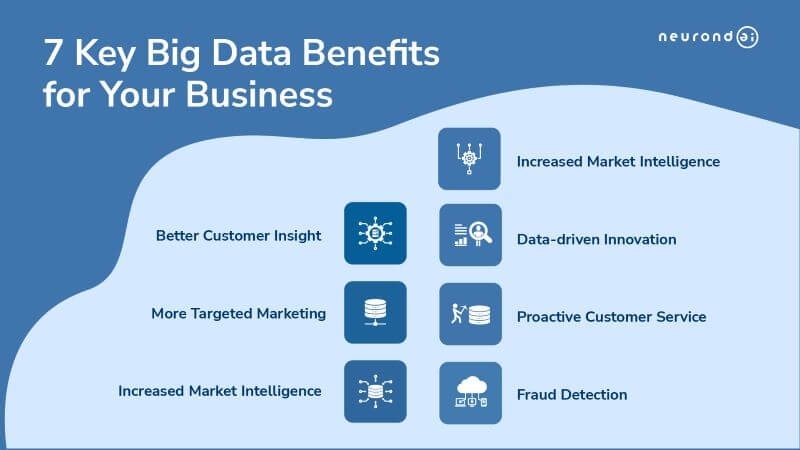7 Benefits of Big Data Helps Small Business Grow Faster
Why Startup Businesses Should Use Big Data
Big businesses aren’t the only ones who can use big data to make data-driven decisions these days. Small businesses can benefit as well. Analyzing all of the online and offline data can help your business grow.
- Big data is defined as extremely large datasets that can be computationally analyzed to reveal patterns, trends, and associations, particularly in relation to human behavior and interactions.
- With the growth of the Internet, wireless networks, smartphones, social media, and other technology, a big data revolution has arrived.
Data provides businesses with the actionable insights they require to increase efficiency and profitability. While small businesses may believe they are too small for big data, they require it just as much as larger corporations.
Big Data can be used to uncover hidden market trends, customer preferences, patterns, and other important insights. Fortunately, small businesses with limited resources and a small workforce can find affordable big data solutions and tools on the market.
1. Drives better customer service
The size of your company, big data can have a big impact on customer service. If a company’s customer service is improved, customers will be happier and sales will increase.
- Customers want to interact with your business in a personal way. They hate generic ads that don’t target a specific demographic.
- They want to know why they should buy your products or services.
- Big data helps businesses anticipate customer needs and create products on demand.
For example, companies on the Trusted Gold IRA Providers list can use big data to improve their content and other communications, improve customer service practices, and ultimately have a positive customer experience.
2. Boosts online sales
Small businesses have a significant online presence. Using big data, you can analyze based on audience behavior and preferences of group leaders.
- It helps marketers create personalized email and newsletter marketing campaigns to increase lead generation and conversions.
- It also helps in optimizing online advertising campaigns by directing customers to the products or services they want to be based on their previous purchases and profile. This increases sales while improving customer satisfaction and experience.
3. Using big data cuts your costs
According to a recent TechCocktail article, Tweedy & Company Real Estate has cut its costs by 15%.
- The company compared contractor maintenance fees to the average of its other vendors.
- As a result of this process, the company identified and eliminated invoice processing errors and automated service schedules.
4. Forecasts future trends
Using big data, your company is no longer limited to present and past insights.
- It can also provide insights into future trends, allowing you to make more accurate business forecasts.
- Using this knowledge in conjunction with custom CRM software can help you automate your conversion workflow with guaranteed ROI.
- You can reach your customers whenever they want, with the content they need.
5. Targets the appropriate leads
Prospects are gathered into your database and then converted later in the lead acquisition process.
- The leads you collect at this stage will determine the marketing, service, and sales techniques you will employ to attract new customers.
- Big data allows you to analyze large amounts of online user data to gain insights into the overall state of the consumer market, helping you find the most relevant and promising leads.
- You can also get data that allows you to create more targeted marketing campaigns to attract these leads.
6. Big data boosts your productivity.
Using digital technology tools increases the efficiency of your business. Using tools like Google Maps, Google Earth, and social media, you can multitask without leaving your desk. These tools save considerable time.
7. Effective decision-making
Big data and social media collaborated to develop processes and specifications for social media mining. It’s similar to data mining, but it’s limited to Instagram, Facebook, LinkedIn, Twitter, and other social media platforms.
- Social media mining involves collecting and analyzing data about social media users to draw conclusions about their interests, buying habits, reactions to ads and deals, and other factors.
- These findings can be used to create targeted marketing campaigns for specific marketing segments.
- Data tools and processes help small businesses mine their social channels, reducing the need for organizations with limited resources to manually wade through multiple social media channels, resulting in more strategic and efficient marketing decisions.
